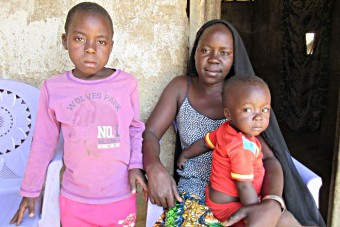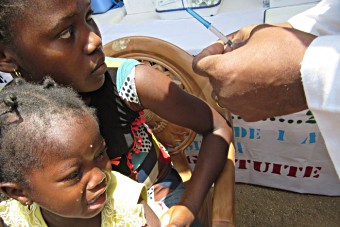
Leroy with his mother and little brother.
Credit: UNICEF/Dédé Nambeanre.
Geneva, 25 April 2017 - Izimili Raude is convinced that a miracle of destiny spared her son Leroy from a potentially lethal meningitis infection.
One year ago, Leroy fell into a coma after contracting meningitis A. With a case fatality rate of 12–19%, his mother feared for his life. Her son had difficulty speaking, but luckily his condition improved after a few weeks. "I have the impression that Leroy is a miracle,” recalls Izimili.
Science, not fate
Almost 12 months later, Izimili knows that relying on science not fate is the surest way to prevent meningitis A. That is why she encouraged everyone in her community to take advantage of campaigns delivering the meningitis A vaccine, held at the end of April.
“I urge all other mothers to bring their children to protect them from meningitis,” she says. “Also, the vaccination campaign is free. It’s important that we all go to avoid spending a lot of money to treat our children if they get sick."
The Central African Republic’s vaccination campaigns against meningitis A, which were supported by Gavi and its partners WHO and UNICEF, targeted 70% of the population.
Bad memory

Meningitis A vaccine campaign. Credit: UNICEF/Dédé Nambeanre.
The Central African Republic experiences meningitis A epidemics every year during the dry season, when dusty winds provide favourable conditions for germs. Many meningitis survivors suffer serious disabilities, including deafness.
"I have seen how devastating this disease can be. It can kill in a few days and cause severe disabilities in surviving children," says Dr Mehoundo Faton, Head of Survival and Child Development at UNICEF Central African Republic.
Today, Leroy's meningitis is no more than a bad memory, but his mother is aware that her son was very lucky. His family lives near a hospital in a country where one third of all children are more than an hour's walk from a health centre.
Hopeful
After the campaigns, the Central African Republic plans to introduce meningitis A vaccine into the routine immunisation system. This year, five other countries are introducing the vaccine with support from Gavi: Burkina Faso, Chad, Gambia, Mali and Niger.
"The vaccine protects for 10 years, so we are hopeful that meningococcal meningitis A will be eliminated from the country in the next few years," says Dr Faton.

Leroy with his mother and little brother.
Credit: UNICEF/Dédé Nambeanre.
Geneva, 25 April 2017 - Izimili Raude is convinced that a miracle of destiny spared her son Leroy from a potentially lethal meningitis infection.
One year ago, Leroy fell into a coma after contracting meningitis A. With a case fatality rate of 12–19%, his mother feared for his life. Her son had difficulty speaking, but luckily his condition improved after a few weeks. "I have the impression that Leroy is a miracle,” recalls Izimili.
Science, not fate
Almost 12 months later, Izimili knows that relying on science not fate is the surest way to prevent meningitis A. That is why she encouraged everyone in her community to take advantage of campaigns delivering the meningitis A vaccine, held at the end of April.
“I urge all other mothers to bring their children to protect them from meningitis,” she says. “Also, the vaccination campaign is free. It’s important that we all go to avoid spending a lot of money to treat our children if they get sick."
The Central African Republic’s vaccination campaigns against meningitis A, which were supported by Gavi and its partners WHO and UNICEF, targeted 70% of the population.
Bad memory

Meningitis A vaccine campaign. Credit: UNICEF/Dédé Nambeanre.
The Central African Republic experiences meningitis A epidemics every year during the dry season, when dusty winds provide favourable conditions for germs. Many meningitis survivors suffer serious disabilities, including deafness.
"I have seen how devastating this disease can be. It can kill in a few days and cause severe disabilities in surviving children," says Dr Mehoundo Faton, Head of Survival and Child Development at UNICEF Central African Republic.
Today, Leroy's meningitis is no more than a bad memory, but his mother is aware that her son was very lucky. His family lives near a hospital in a country where one third of all children are more than an hour's walk from a health centre.
Hopeful
After the campaigns, the Central African Republic plans to introduce meningitis A vaccine into the routine immunisation system. This year, five other countries are introducing the vaccine with support from Gavi: Burkina Faso, Chad, Gambia, Mali and Niger.
"The vaccine protects for 10 years, so we are hopeful that meningococcal meningitis A will be eliminated from the country in the next few years," says Dr Faton.
